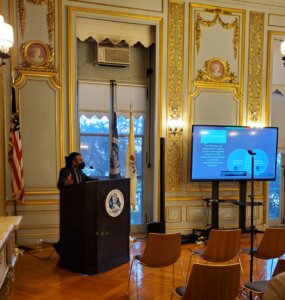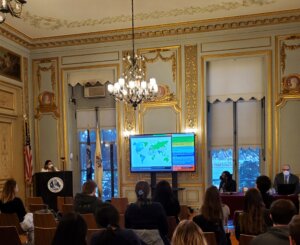By Grace Joyce,

On March 1, 2022, the Institute for Global Understanding (IGU) had the honor of hosting a panel, Preventing the Next Pandemic: The Draft Convention on Animal Protection. Moderated by Prof. Randall Abate, the panel included two members from Lewis & Clark Law School in Portland, Oregon: Marcia Condoy, a Peruvian animal lawyer and L.L.M. candidate in animal law, and Dr. Rajesh K. Reddy, director of the Global Animal Law and advanced degree programs in animal law. The discussion examined the COVID-19 pandemic and how, like many of its predecessors such as Lyme disease, Ebola, and HIV-AIDs, this pandemic was caused by a zoonotic virus. In other words, many of these deadly viruses have been passed from animals to humans in a “spillover event.” The panelists provided an overview of the goals and framework of the draft Convention on Animal Protection (CAP) treaty and emphasized the significance of the connection among human health, animals, and the environment.
Dr. Reddy offered background context to provide an understanding as to why protecting animal health is synonymous with protecting human health and preventing the next pandemic. He noted that about 75% of all diseases that afflict humans are of zoonotic origin, and a number of these have higher mortality rates than COVID-19. These diseases are spread among animals from systemic cruelty, which manifests in many ways such as being placed in overcrowded facilities with various species where they suffer from open sores, starvation, and compromised immune systems. The spillover risk occurs when humans are in high risk contact with the animals who are highly susceptible to disease, which occurs in many animal exploitation contexts such as factory farms, puppy mills, and hunting. He further observed that spillovers require application of a “one health” approach because it recognizes that the health of people is closely connected to the health of animals and our shared environment. Dr. Reddy further explained why a pandemic treaty is necessary, as states need to work together to combat these issues and increase animal protection to safeguard human health.

This is where the Convention on Animal Protection (CAP) will have an important role. Ms. Condoy provided an overview of the treaty and its fundamental provisions and prohibitions. The treaty stresses the importance of coexistence and ethical treatment of animals, and seeks to protect animals from unnecessary killing and suffering to improve their lives, which will help improve human health. It proposes to regulate wildlife and their habitats, transportation, companion and commercial animals, and animals in research and entertainment. The treaty seeks to prohibit live animal testing and use of performance enhancing drugs on animals, and avoid mixing incompatible species. CAP focuses on animal welfare rather than animal rights because implementing a global standard of care for animals must be feasible to get as many states to participate as possible.
The discussion concluded with a Q&A session in which audience members asked Dr. Reddy and Ms. Condoy questions to further understand the objectives and mechanisms of the treaty as well as how it will be implemented. By the end of the discussion, it was apparent that animal health, human health, and the environment are interdependent and a one health approach will be necessary to prevent the next pandemic.

